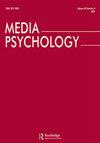这是Insta的一项创新!探索减少Instagram上社交比较负面后果的认知对策
IF 2.6
2区 心理学
Q1 COMMUNICATION
引用次数: 7
摘要
摘要Instagram等社交网站为用户提供了大量的社交比较线索,可能会导致嫉妒和自卑。我们进行了两个实验,研究这种负面后果是否可以通过短暂的认知干预来减轻。在实验1(N=391)中,我们在受试者之间的2×2(干预:免责声明与对照)×2(Instagram个人资料:向上与向下比较标准)设计中提醒用户大多数Instagram帖子的不切实际性质。积极和消极影响、嫉妒、自尊和幸福感是因变量。实验2(N=184)探讨了稍长的认知干预(“认知偏见”与“成长心态”与控制)是否可以改善参与者的向上比较体验,保护他们免受嫉妒或自尊的丧失。两个实验都包括社会比较取向(SCO)作为潜在的调节因素。结果表明,引发向上比较确实引发了更多的嫉妒,上合组织调节了这种影响。我们进一步观察到,通过参与者的社会比较体验,显示的Instagram个人资料对积极情感、嫉妒、自尊和幸福感的间接影响。然而,关于认知干预,我们报告称,无论是权威的免责声明,还是对用户进行认知偏见或心态的教育,都没有显著减少社会比较的负面后果。本文章由计算机程序翻译,如有差异,请以英文原文为准。
This is an Insta-vention! Exploring Cognitive Countermeasures to Reduce Negative Consequences of Social Comparisons on Instagram
ABSTRACT Social networking sites such as Instagram provide users with numerous social comparison cues, potentially leading to envy and lower self-esteem. We conducted two experiments, examining whether such negative consequences could be mitigated by brief cognitive interventions. In Experiment 1 (N = 391), we reminded users of the unrealistic nature of most Instagram posts in a 2 (intervention: disclaimer vs. control) × 2 (Instagram profile: upward vs. downward comparison standard) between-subjects design. Positive and negative affect, envy, self-esteem, and well-being served as dependent variables. Experiment 2 (N = 184) explored whether slightly longer cognitive interventions (“cognitive bias” vs. “growth mindset” vs. control) could improve participants’ experience of upward comparisons, shielding them against envy or the loss of self-esteem. Both experiments included social comparison orientation (SCO) as a potential moderator. Results show that eliciting upward comparisons indeed evoked more envy, with SCO moderating the effect. We further observed indirect effects of the shown Instagram profiles on positive affect, envy, self-esteem, and well-being via participants’ social comparison experience. Concerning the cognitive interventions, however, we report that neither an authoritative disclaimer, nor educating users about cognitive biases or mindsets significantly reduced the negative consequences of social comparisons.
求助全文
通过发布文献求助,成功后即可免费获取论文全文。
去求助
来源期刊

Media Psychology
Multiple-
CiteScore
8.60
自引率
7.10%
发文量
30
期刊介绍:
Media Psychology is an interdisciplinary journal devoted to publishing theoretically-oriented empirical research that is at the intersection of psychology and media communication. These topics include media uses, processes, and effects. Such research is already well represented in mainstream journals in psychology and communication, but its publication is dispersed across many sources. Therefore, scholars working on common issues and problems in various disciplines often cannot fully utilize the contributions of kindred spirits in cognate disciplines.
 求助内容:
求助内容: 应助结果提醒方式:
应助结果提醒方式:


